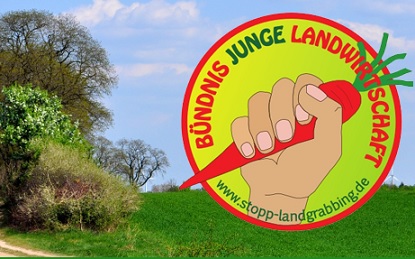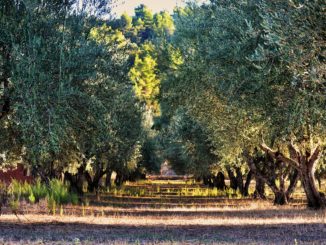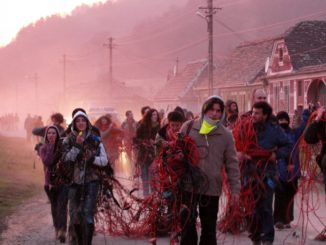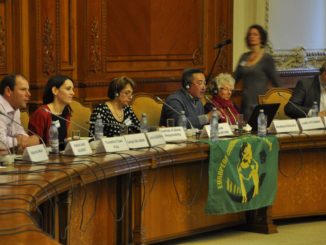A small organic farm near Berlin has written a public statement on a growing cause for concern: landgrabbing. Through the statement, the farm, its association and all employees, members and friends want to raise awareness of the process which they are being exposed to. Landgrabbing is now affecting the whole region and many other regions around the world.
In the coming weeks, a number of actions are planned as the Bündnis Junge Landwirtschaft continues its fight against those who are buying up the land on which they live and farm.
 Landgrabbing? Ever heard of it?
Landgrabbing? Ever heard of it?
(It’s like when you get kicked outta your apartment in a city due to the rent rising for years.)
What does landgrabbing have to do with you? Do you like to determine what you eat (maybe choosing regional products)? Find some resort in the surrounding nature? Or ever discussed why more and more (young) people are leaving the countryside? (This being a massive problem in east Germany; where we live).
One aspect that plays into all these and more points is the land privatization policy decided upon after East Germany was united with the West. The importance of access to land is quite clear: without it we can’t produce any regional food. Without sustainable agriculture our surroundings are being shaped more and more into endless agricultural deserts. Without work binding (regional) businesses and structures, there is no future perspective for us (young) people in eastern Germany, or anywhere else in the world for that matter.
Landgrabbing in Germany?
Yes – and actually just in front of our little farm door. For three years we, the organic farm of Bienenwerder, have been under the constant threat of losing our existence due to the land privatization policies of our government. And now, once again they are putting a chunk of land surrounding our farm up for sale.
Just to give you a single example of the massive scale of sales that result in what we are talking about: KTG Agrar, the first German purely agricultural business on the stock market, already owns something like 35,000 ha in our region. Starting from somewhere behind our back door in loose plots all the way to the Polish border. They own land all the way up to Lithuania too.
This land privatization process – or let’s call it sellout – was decided upon years ago, just as the wall between western and eastern Germany was coming down. It is defined by a major oversight whereby the decision regarding who gets the formally socialist-state-owned land is determined purely by the highest bid. The bet does not consider additional criteria such as who will farm the land more sustainably, or create more work places, or even who might actually live there. This decision has paved way for the masses of public land being sold only to big enterprises and investors.
The criteria are in no way adjusted to the importance a piece of land might have for existing local business. An “independent” enterprise was founded for the purpose of facilitating the selling. This agency is called “BVVG – Bodenverwertungs und –verwaltungs GmbH” which translates into something like “Land utilization and administration company”. Having the wrong policy making strengthening their evil back bone, their selling strategies have further tightened reality for local farming. This has led to a massive growth of property sizes for some, while most small and middle scale businesses are on the losing side. The Weltagrarbericht (World Agriculture Report) has already confirmed the importance of these smaller sized farms: they are indispensable for rural development just as for the sufficient covering of the diverse food needs for people in the cities.
We are exactly such a farm: our size is in proportion to regional farms (about 50 ha). We grow a wide diversity of more than 100 different vegetables, fruits, herbs and flowers. Instead of dumping lots of money into expensive techniques and petrol, we work sustainably with many people and working horses – without being romantically back worded. We market our products directly to nearby Berlin. Surrounding lands are the grazing lands for our goats and working horses, whilst at the same time giving space to the wild living biodiversity. They feed directly into the waters and areas of a natural reserve park.
The result of what happens when ’somebody’ gets the land is something we have recently witnessed here. Areas of forest went to a private investor, who started off by sending in a massive harvester machines for an intensive wood harvest and is now planning a large-scale application to the whole forest with “Roundup”, a glyphosate total herbicide – Bon Appetit and long live the protection of biodiversity!
Increasing the pressure
Through our efforts we have been able to secure some pieces of land and we have become known as a farm that knows how to resist. Through the foundation of the Bündnis junge Landwirtschaft (Confederation of young farmers) last year, political pressure has been effectively increased on the BVVG to act with a tiny bit more decently in the public eye. Only through political campaigns were we able to discover that the agency actually has to put land out for sale in so-called limited auctions. The criteria underlining this are that only young farmers, organic farmers or intensive farmers (careful: here they implicitly mean intensive animal farming too) can apply to buy. Of course they had never in the past mentioned or offered such a possibility for any of the land we rely on.
Part of these criteria could be a reason of joy to us, no question. But again they need to be put in the context we are in: the BVVG has for many years not met their obligation to use this possibility. Sometimes they would have silently put out a “little triangle plot of land between two train tracks” only that there were no organic farms around and not even a path leading to the land. Then they could easily say nobody had an interest. None of us has ever been offered a chance to take part in a limited auction for the lands we live on and that we asked to buy. We young farmers have started to defend ourselves.
Now the plot next to our farm is out in a limited auction. Our farm is to be used to state an example of the agencys’ good will – that never existed
While we have to compete in a system we can’t compete in, they have added one more criteria – a very simple and material criteria we can’t fulfill: money. The minimum offer they set the bid to start with is determined by the highest offers they have had in the past achieved to gain in sales for lands in recent years in the surrounding region. The price developments though themselves have been created by the selling strategies of the BVVG and the investors needs to invest in uneasy times. A farm like ours, which suddenly was confronted with their little lands being put out for sale, the lands our vegetable gardens are on, just adjacent to our houses was of course “willing” to pay the higher and higher prices the BVVG demanded. By doing this to save our existence in the past, we ourselves were instruments in developing the high prices per hectare. These prices have easily tripled in less than five years.
They are by now completely decoupled from what you can re-earn by any “normal” farming on Brandenburg land (usually lots of sand). We perceive this limited auction of our surrounding lands by the BVVG as a so called offer to us young sustainable farmers as the impertinence it is: We know it is supposed to serve only the cause of freeing the responsible policy and the BVVG from public pressure. As long as the method of price is another method against us, just to be able to say afterwards we weren’t there to put a bid, this is nothing but washing themselves. Of course young farmers, small scale farmers, middle scale farmers and sustainable farmers cannot compete on this level.
The responsibility lies with the BVVG, through the strategies they use, just as it lies with the Ministry of Finance which overlooks and decides on all transactions and by its role is politically paving the way for the sellout of our common good: the regional agricultural lands.
Taking action
As a farm we demand a reasonable orientation of price and not one that orientates itself on landgrabbing in East Germany which we (all) can’t afford. We will not let ourselves be instrumentalised as a greenwashing strategy of the BVVG or our government.
As young farmers we demand an immediate stop to all sales and a common decision for land giving policies of the remaining lands in East Germany.
We invite you as consumers of food, as inhabitants of the region and as participants of shared struggles to develop these demands together with us. We can not defend our common grounds alone and we are not defending our individual future.
IN THE COMING WEEKS WE ARE PLANNING DIFFERENT ACTIONS:
First up: 17 JULY, 2 pm: Come all to our public money-throw-out at the central office of the BVVG in Berlin! (Schönhauser Allee 120)
For more informaton contact: JULIA BARTAL (Hof Bienenwerder): 0049 – 176 64 27 32 98 or email: bienenwerder@web.de




